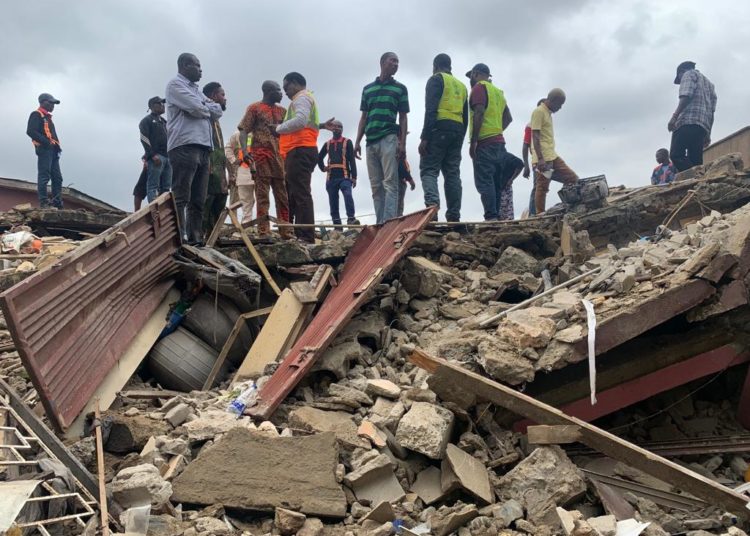A disturbing trend is emerging in the nation’s construction industry as building collapse that used to be few and far between is now fast turning into a regular occurrence. Reports of this scenario that cuts across the six geo-political zones, the tragedy it brings about with the attendant lose of lives, jars the sensibility of the people who look up to the government for a review of the laws that guide operations in the sector and also ensure strict compliance.
So far, even with the tragedies that are involved, in very few cases have there been punishment for infractions either to the promoters of the owners of the collapsed building or the government officials whose incompetence contributed to the collapse.
We recall that in September, two persons were confirmed dead, while four construction workers were trapped under the debris of an uncompleted seven-storey building at Oba Abiodun Oniru Street, Oniru Estate, Lekki, Lagos.
It is instructive to note that the Lagos State Emergency Management Agency, LASEMA, had revealed that at least 30 collapsed buildings were recorded in various incidents which occurred between January and July 2022 in Lagos State.
The latest data was contained in a comprehensive report which recorded the incidents that happened during the period under review, released by the Permanent Secretary of the agency, Dr. Femi Oke-Osanyitolu. According to the data, out of the 973 emergency cases recorded across the metropolis, the Alimosho council area topped the list of occurrences. The building collapse incidents recorded, showed 24 total collapses, six partial collapses, with one impending collapse.
Similarly, according to media reports, no fewer than 84 persons have lost their lives in 18 building collapses in Lagos State in the last two years. Also, barely four weeks since a five-story hotel building collapsed in the Bodija area in Ibadan, and another 2- story building collapsed again in the same area last Sunday night.
Last month, a four-story building in Uyo, the Akwa Ibom capital, collapsed with several residents reportedly trapped in the rubble. In August, one person was killed after a multiple-story building collapsed in Kano which left many feared trapped inside. Also in August, two persons were confirmed dead after a three-story building collapsed in Kubwa Satellite town, Abuja.
In the considered opinion of this newspaper, it is safe to surmise that we have an epidemic of building collapse in the country. Regrettably, in our view, from 1974 to July 2021, statistics show that over 461 buildings have collapsed in Nigeria with over 1,090 deaths recorded and many injured. Over the years, Lagos recorded over 295 cases, Abuja 16, Oyo, 16, Anambra 15, Kano 9, Ondo 10, Abia 9, Kwara 8, Rivers 8, Delta 8, Enugu 7, Ogun 7, Plateau 6, Kaduna 6, Edo 6, Imo 5, Osun 5, Benue 3, Adamawa 3, and Ebonyi 3. Others are Niger 2, Kebbi 2, Ekiti 2, Cross River 2, Sokoto 1, Bauchi 1, Akwa-Ibom, Kogi 1, and Katsina one.
Experts have also attributed the causes of incessant collapse to substandard building materials, pilfering, faulty non-adherence to designs, lack of comprehensive subsoil investigation before designs are done, illegal conversion or alterations to existing structures, and use of quacks or unskilled builders.
Furthermore, the recent commercialisation and revenue-generating posture of the real estate sector have affected the quality and standard of buildings. Needless to say, the country has recorded many building collapses because offenders are not severely punished, if at all.
We insist that the government must identify and prosecute landowners, investors, consultants, architects, quantity surveyors, and engineers involved in previous cases. It must also publish all permits received during those projects and all documents related to safety testing.
Similarly, the government should ensure strict enforcement of laws and policies guiding building in the country. Corrupt public officials who overlook or fail to implement existing building control regulations should be punished to serve as a deterrent. Sadly, corruption in every sphere of our lives is the reason for the weak enforcement of government laws and policies.
It is important that regulatory bodies and agencies ought to wake up to their responsibilities. The National Bureau of Statistics data shows that about 71.4 percent of households in Nigeria do not have a certificate of occupancy, 13.2 percent do not have title deeds, and only 8.1 percent have certificates. Another alarming aspect of the data is that 33.9 percent of households have ownership certificates in Lagos state.
Consequently, we insist that it must not be business as usual, there should be punishment for bad behaviours. That is the only way the nation can build a strong and efficient system we all should be proud of.





